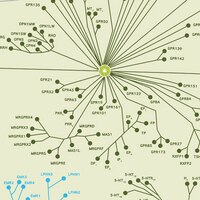Past, present and future--beta2-adrenoceptor agonists in asthma management.
Sears, Malcolm R and Lötvall, Jan
Respiratory medicine, 99: 152-70 (2005)
2004
Mostrar resumen
The beta-adrenoceptor agonists (beta-agonists) have been used to relieve bronchoconstriction for at least 5000 years. beta-agonists are based on adrenaline and early forms, such as isoprenaline, Lacked bronchial selectivity and had unpleasant side effects. Modern beta-agonists are more selective for the beta2-adrenoceptors (beta2-receptors) located in bronchial smooth muscle and have less cardiotoxicity. Traditional beta2-adrenoceptor agonists (beta2-agonists), such as salbutamol, terbutaline and fenoterol, were characterised by a rapid onset but relatively short duration of action. While valuable as reliever medication, their short duration gave inadequate night-time relief and limited protection from exercise-induced bronchoconstriction. beta2-agonists with longer durations of action, formoterol and salmeterol, were subsequently discovered or developed. When combined with inhaled corticosteroids they improved lung function, and reduced symptoms and exacerbations more than an increased dose of corticosteroids. However, tolerance to the bronchprotective effects of long-acting beta2-agonists and cross-tolerance to the bronchodilator effects of short-acting beta2-agonists is apparent despite use of inhaled corticosteroids. The role of beta2-receptor polymorphisms in the development of tolerance has yet to be fully determined. Formoterol is unique in having both a long-lasting bronchodilator effect (> 12 h) and a fast onset of action (1-3min from inhalation), making it effective both as maintenance and reliever medication. The recent change in classification from short- and long-acting beta2-agonists to rapid-acting and/or long-acting agents reflects the ongoing evolution of beta2-agonist therapy. | 15715182
 |
Mechanisms of disease: beta-adrenergic receptors--alterations in signal transduction and pharmacogenomics in heart failure.
Feldman, David S, et al.
Nature clinical practice. Cardiovascular medicine, 2: 475-83 (2005)
2004
Mostrar resumen
Beta-adrenergic signaling is an important regulator of myocardial function. During the progression of heart failure (HF), a reproducible series of biochemical events occurs that affects beta-adrenergic receptor (beta-AR) signaling and cardiac function. Furthermore, there are pathophysiologic alterations in the expression and regulation of proteins that are regulated by beta-ARs during HF. Analyses of these complex signaling pathways have led to a better understanding of HF mechanisms and the use of beta-adrenergic antagonists, which have notably altered HF-related morbidity and mortality. Despite therapeutic advances that have affected beta-AR signaling, HF remains a leading cause of hospitalization and a principal cause of death in industrialized nations. In this review, we summarize current insights into beta-adrenergic signal-transduction pathways, the best-described beta-AR polymorphisms, and therapies that target the beta-AR pathway in HF. | 16265588
 |


















